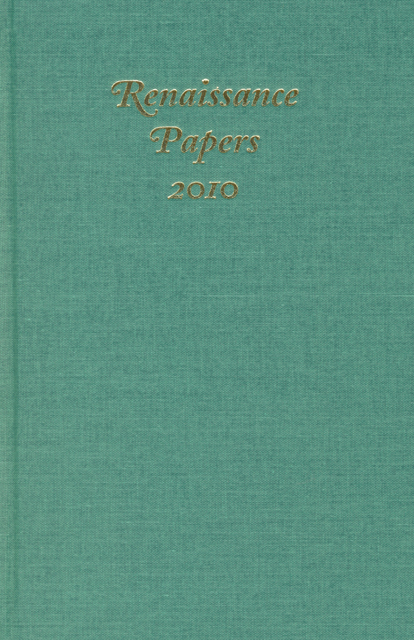Book contents
- Frontmatter
- Contents
- Renaissance Papers
- Aretino’s Life and His Afterlife in England
- Mixing Genres in George Peele’s David and Bethsabe
- Royal Prerogative versus the Common Law in A View of the Present State of Ireland and The Faerie Queene, Book 5
- The Limits of Clowning in the Age of Marprelate: The Anti-Martinist Tracts and 2 Henry VI
- Shakespeare’s Iago
- Francesco Patrizi da Cherso, Caravaggio, and the Metaphysics of Light
- Being John Donne in 1602
- The Problem of the Human in Sir Francis Bacon
- The Glamorous Echoes of Godly Print
- “More cullors than the Rainbowe caries”: Catholics, Cosmetics, and the Aesthetic Economy of Protestant England
“More cullors than the Rainbowe caries”: Catholics, Cosmetics, and the Aesthetic Economy of Protestant England
Published online by Cambridge University Press: 10 February 2023
- Frontmatter
- Contents
- Renaissance Papers
- Aretino’s Life and His Afterlife in England
- Mixing Genres in George Peele’s David and Bethsabe
- Royal Prerogative versus the Common Law in A View of the Present State of Ireland and The Faerie Queene, Book 5
- The Limits of Clowning in the Age of Marprelate: The Anti-Martinist Tracts and 2 Henry VI
- Shakespeare’s Iago
- Francesco Patrizi da Cherso, Caravaggio, and the Metaphysics of Light
- Being John Donne in 1602
- The Problem of the Human in Sir Francis Bacon
- The Glamorous Echoes of Godly Print
- “More cullors than the Rainbowe caries”: Catholics, Cosmetics, and the Aesthetic Economy of Protestant England
Summary
Politics and political economy, to be sure, are implicated in every discourse on art and on the beautiful,” Jacques Derrida writes at the outset of “Economimesis” (3). Derrida’s subject, Immanuel Kant’s Third Critique, the Critique of Judgment, is no different, though the exact influence politics and political economy have on the Critique is not so certain. Tracing that influence is Derrida’s aim in the article, but he claims that the politicization of historical discursive networks impedes the type of analysis he wants to pursue in “Economimesis,” preventing him from isolating a point of origin and requiring him “once again to feign a point of departure in examples” (2). “Economimesis” exists in spite of discursive politicization and contextualization; my present analysis exists because of that politicization and contextualization. Focusing on Thomas Dekker’s post-Gunpowder Plot play The Whore of Babylon (1606) and early modern discourse surrounding English cosmetics use, I will examine the long and narrow of a particular sequence of imitation and representation in a specific historical system: the Protestant moral aesthetics of early reformed England. This discourse was not just about art; it was socially expansive and prioritized the ideological work of conscience-shaping. It aspired to be socially transformative, advancing an ideal of Englishness based on simplicity and virility.
Dekker’s The Whore of Babylon captures the Protestant ideal of simplicity by contrasting it with Catholic adornment. Envisioning England as a Faerie realm, the play pits its figure of the pope, the Empress of Babylon, against Titania, an idealized Elizabeth. It chronicles three attempts by Catholic conspirators on Titania’s life and culminates in the defeat of the Armada. In the Lectori preceding the play, Dekker describes the middle course he tries to navigate between Protestantism and Catholicism: “In sayling vpon which two contrary Seas, you may observe, on how direct a line I haue steered my course: for of such scantling are my words set downe, that neither the one party speakes to much, nor the other (in opposition) too little in their owne defence.” Dekker claims that he has bound himself to harmony; equality and symmetry direct him. But he tips the scales of representation toward his own Protestant agenda.
- Type
- Chapter
- Information
- Renaissance Papers 2010 , pp. 135 - 160Publisher: Boydell & BrewerPrint publication year: 2011

